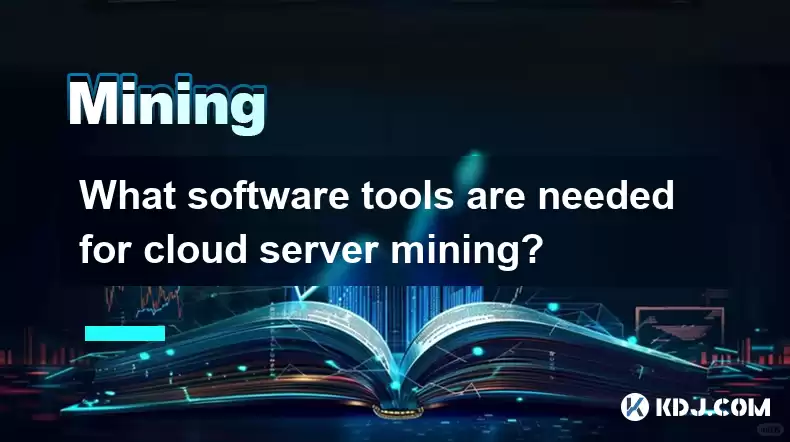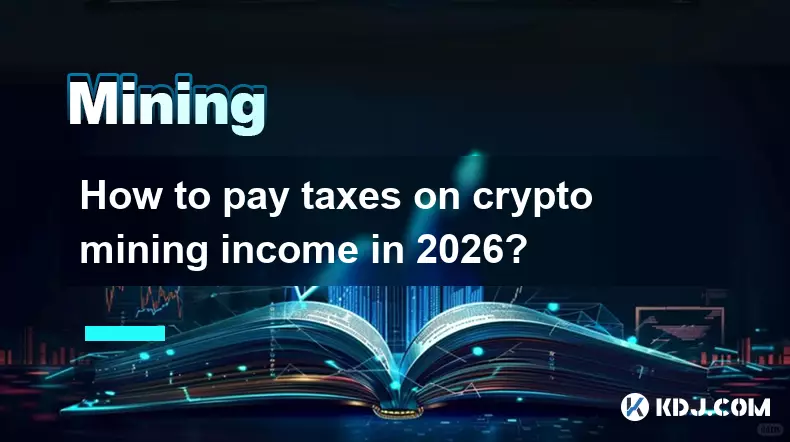-
 bitcoin
bitcoin $87959.907984 USD
1.34% -
 ethereum
ethereum $2920.497338 USD
3.04% -
 tether
tether $0.999775 USD
0.00% -
 xrp
xrp $2.237324 USD
8.12% -
 bnb
bnb $860.243768 USD
0.90% -
 solana
solana $138.089498 USD
5.43% -
 usd-coin
usd-coin $0.999807 USD
0.01% -
 tron
tron $0.272801 USD
-1.53% -
 dogecoin
dogecoin $0.150904 USD
2.96% -
 cardano
cardano $0.421635 USD
1.97% -
 hyperliquid
hyperliquid $32.152445 USD
2.23% -
 bitcoin-cash
bitcoin-cash $533.301069 USD
-1.94% -
 chainlink
chainlink $12.953417 USD
2.68% -
 unus-sed-leo
unus-sed-leo $9.535951 USD
0.73% -
 zcash
zcash $521.483386 USD
-2.87%
What software tools are needed for cloud server mining?
Cloud server mining needs specialized software (like CGMiner or Ethminer), remote desktop access (TeamViewer, AnyDesk), a suitable OS (Ubuntu Server), robust security (firewalls, strong passwords), and monitoring tools for efficient and secure cryptocurrency mining.
Mar 06, 2025 at 01:12 pm

- Cloud server mining requires specific software tailored to the chosen cryptocurrency and mining algorithm.
- Essential tools include mining software, a remote desktop application, and potentially monitoring software.
- Choosing the right operating system (OS) is crucial for optimal performance and compatibility.
- Security is paramount; robust firewalls and secure remote access protocols are necessary.
- Careful consideration of server specifications is essential for profitability and efficiency.
What Software Tools Are Needed for Cloud Server Mining?
Cloud server mining offers a convenient alternative to setting up physical mining rigs. However, it necessitates the use of specific software tools to manage and optimize the mining process. Understanding these tools is crucial for successful and profitable cloud mining.
1. Mining Software:The core of your cloud mining operation is the mining software. This software interacts with your chosen cryptocurrency's network, solving complex mathematical problems to earn rewards. The specific software will vary depending on the cryptocurrency you're mining. For example, mining Bitcoin typically involves software like CGMiner or BFGMiner, while Ethereum might use Ethminer or Claymore's Dual Miner. These programs are often command-line based, requiring some technical familiarity.
2. Remote Desktop Software:Since you're not physically interacting with the server, a remote desktop application is essential. This allows you to control the server and manage the mining software remotely. Popular choices include TeamViewer, AnyDesk, and Microsoft Remote Desktop. Selecting a secure and reliable option is paramount to prevent unauthorized access. Proper configuration of these tools is vital for maintaining control and security.
3. Operating System (OS):The choice of operating system impacts the performance and compatibility of your mining software. Linux distributions, particularly those optimized for mining like Ubuntu Server, are generally preferred for their stability, performance, and command-line interface. Windows Server is also an option, but it may be less efficient for resource-intensive mining operations. Careful consideration of the OS's compatibility with your chosen mining software is critical.
4. Monitoring Software:To track your mining progress, profitability, and hardware health, monitoring software can be invaluable. These tools provide real-time statistics on hash rate, temperature, power consumption, and other vital metrics. Many mining software packages include basic monitoring features, but dedicated monitoring tools offer more advanced features and detailed insights. This allows for proactive adjustments to maximize efficiency.
5. Security Software:Security is paramount in cloud mining. Your server contains valuable cryptocurrency assets and sensitive data. A robust firewall is essential to protect against unauthorized access and cyberattacks. Regular software updates are crucial to patch vulnerabilities. Furthermore, employing strong passwords and two-factor authentication are vital for added security. Secure remote access protocols should be used at all times.
6. Server Management Tools:Managing a cloud server effectively requires dedicated tools. This often involves using the web interface provided by your cloud hosting provider (e.g., AWS, Google Cloud, Azure) to manage server resources, storage, and networking. Understanding these tools is crucial for efficiently allocating resources and troubleshooting any issues that may arise. Familiarizing yourself with the provider's documentation is essential.
7. Wallet Software:Finally, you’ll need a secure cryptocurrency wallet to store the mined cryptocurrency. Choosing a reputable wallet, whether hardware or software-based, is essential to safeguard your earnings. The type of wallet will depend on the specific cryptocurrency you are mining. Security best practices should always be followed when managing your cryptocurrency wallet.
Frequently Asked Questions:Q: What are the minimum server specifications for cloud mining?A: The minimum specifications depend heavily on the cryptocurrency being mined and its mining algorithm. Generally, you'll need a powerful CPU, substantial RAM (at least 8GB), and a significant amount of storage. However, GPUs are typically more effective for many cryptocurrencies. Always check the specific requirements of your chosen mining software.
Q: Is cloud server mining profitable?A: The profitability of cloud server mining is highly variable and depends on several factors, including the price of the cryptocurrency, the difficulty of the mining algorithm, the cost of electricity (for the server), and the hash rate of your server. It's crucial to conduct thorough research and calculations to determine if it's profitable in your specific circumstances. Mining profitability can fluctuate significantly.
Q: Are there any free cloud server mining options?A: While some services might offer free trials or limited free access, truly profitable cloud mining usually requires a financial investment for server rental and potentially mining software licenses. Be wary of any "free" options that promise unrealistic returns, as they are often scams.
Q: How do I choose the right cloud provider?A: When choosing a cloud provider, consider factors like cost, reliability, security, performance, and the availability of the necessary resources (CPU, GPU, RAM, storage). Research different providers and compare their offerings to find the best fit for your needs and budget. Reputation and customer support are also important factors to consider.
Q: What are the risks associated with cloud server mining?A: Risks include server downtime, security breaches, fluctuating cryptocurrency prices, and the potential for scams. Thorough research, careful selection of providers and software, and strong security measures are crucial to mitigate these risks. Understanding the potential downsides is vital before investing in cloud mining.
Disclaimer:info@kdj.com
The information provided is not trading advice. kdj.com does not assume any responsibility for any investments made based on the information provided in this article. Cryptocurrencies are highly volatile and it is highly recommended that you invest with caution after thorough research!
If you believe that the content used on this website infringes your copyright, please contact us immediately (info@kdj.com) and we will delete it promptly.
- Wintermute CEO Dismisses Crypto Collapse Rumors Amidst Market Volatility
- 2026-02-09 01:45:01
- Trump's Crypto Tango: White House Talks Ignite BTC & PKR Markets
- 2026-02-09 01:40:01
- Ethereum's Volatility: Navigating Longs Amidst WAGMI Hopes and Technical Upgrades
- 2026-02-09 01:35:02
- Web3, RWA, and the Regulatory Reckoning: Charting a Course for Compliant Innovation
- 2026-02-09 01:30:01
- Super Bowl Coin Toss: Decoding the Flip, Betting Tips, and a Historic Twist for the Big Game
- 2026-02-09 01:25:01
- Heads Up, New York! Super Bowl 2026 Coin Toss, Free Bets, and the Unpredictable Flip of Fate
- 2026-02-09 01:20:02
Related knowledge

How to mine crypto sustainably in 2026?
Feb 07,2026 at 04:20pm
Energy Source Optimization1. Miners increasingly deploy solar arrays directly on warehouse rooftops to power ASIC rigs during daylight hours. 2. Geoth...

How to mine Conflux on a standard gaming laptop?
Feb 07,2026 at 04:19am
Hardware Requirements for Conflux Mining1. Conflux uses a proof-of-work consensus mechanism called Tree-Graph, which is designed to be ASIC-resistant ...

How to buy hashing power on cloud mining platforms?
Feb 08,2026 at 05:59pm
Understanding Cloud Mining Contracts1. Cloud mining platforms offer users the ability to rent hashing power without owning or maintaining physical har...

How to mine Flux with a 30-series Nvidia GPU?
Feb 07,2026 at 02:40pm
Market Volatility Patterns1. Bitcoin price movements often exhibit sharp intraday swings exceeding 5% during low-liquidity windows, particularly betwe...

How to pay taxes on crypto mining income in 2026?
Feb 07,2026 at 01:20am
Tax Classification of Mining Rewards1. Cryptocurrency received as mining rewards is treated as ordinary income by most major tax jurisdictions includi...

How to find the lowest fee mining pools for BTC?
Feb 07,2026 at 01:00pm
Fee Structure Transparency1. Most reputable BTC mining pools publish their fee schedules directly on their official websites, often under sections lab...

How to mine crypto sustainably in 2026?
Feb 07,2026 at 04:20pm
Energy Source Optimization1. Miners increasingly deploy solar arrays directly on warehouse rooftops to power ASIC rigs during daylight hours. 2. Geoth...

How to mine Conflux on a standard gaming laptop?
Feb 07,2026 at 04:19am
Hardware Requirements for Conflux Mining1. Conflux uses a proof-of-work consensus mechanism called Tree-Graph, which is designed to be ASIC-resistant ...

How to buy hashing power on cloud mining platforms?
Feb 08,2026 at 05:59pm
Understanding Cloud Mining Contracts1. Cloud mining platforms offer users the ability to rent hashing power without owning or maintaining physical har...

How to mine Flux with a 30-series Nvidia GPU?
Feb 07,2026 at 02:40pm
Market Volatility Patterns1. Bitcoin price movements often exhibit sharp intraday swings exceeding 5% during low-liquidity windows, particularly betwe...

How to pay taxes on crypto mining income in 2026?
Feb 07,2026 at 01:20am
Tax Classification of Mining Rewards1. Cryptocurrency received as mining rewards is treated as ordinary income by most major tax jurisdictions includi...

How to find the lowest fee mining pools for BTC?
Feb 07,2026 at 01:00pm
Fee Structure Transparency1. Most reputable BTC mining pools publish their fee schedules directly on their official websites, often under sections lab...
See all articles





















![Is This a REAL Reversal or Fake out?? I wouldn't Get Excited Just Yet... [20 Min emergency stream] Is This a REAL Reversal or Fake out?? I wouldn't Get Excited Just Yet... [20 Min emergency stream]](/uploads/2026/02/08/cryptocurrencies-news/videos/origin_698897450a654_image_500_375.webp)


![Mesocosmos (By Biskotos) [All Coins] | Geometry Dash Mesocosmos (By Biskotos) [All Coins] | Geometry Dash](/uploads/2026/02/08/cryptocurrencies-news/videos/origin_69889be2eac64_image_500_375.webp)

















































